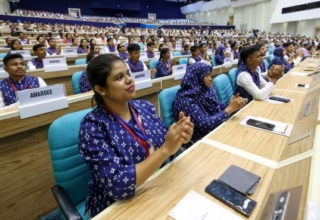
The findings show that even if countries reach their benchmarks, the world will still fall short of the ambition set out in SDG 4
A new report released on January 24, 2022 – World Education Day, by UNESCO’s Institute for Statistics and the Global Education Monitoring Report finds that, according to their own benchmarks, countries will not achieve Sustainable Development Goal 4 (SDG 4) of ensuring inclusive and equitable quality education and lifelong learning opportunities for all by 2030.This is a wakeup call for the world’s leaders as millions of children will continue to miss out on school and high‐quality learning.
The report, National SDG 4 benchmarks: fulfilling our commitments, compiles the findings from the culmination of a two‐year global process convened by UNESCO. Participating countries identified their targets for 2025 and 2030 relative to six key SDG 4 indicators on: early childhood education attendance; school attendance; completion; minimum proficiency in reading and mathematics; trained teachers; and public education expenditure. The commitment made was to accelerate progress between now and the deadline relative to the rate countries achieved from 2000‐2015. The findings show that even if countries reach their benchmarks, the world will still fall short of the ambition set out in SDG 4. This is even before taking into account the potential consequences of COVID‐19 on education development.
“It is a real step forward that some two‐thirds of countries are realistically assessing their chances of achieving the SDG 4 goals. It is critical that nations hold themselves accountable to their commitments for their children. However, almost halfway to our deadline, the process has shown that, even by their own assessment, most countries are not expected to get close to the 2030 goal,” said Silvia Montoya, Director of the UNESCO Institute for Statistics. “The next step must be to encourage all countries to submit benchmarks and determine which policies to prioritise before 2030.”
The report shows that according to their own measures, Latin America and the Caribbean and Central and Southern Asia are on course to achieve universal early childhood education. Sub‐Saharan Africa, North Africa and Western Asia will not achieve this goal, where it is estimated that roughly two in three children will be enrolled in early childhood education by 2030 (up from less than half currently).
The current benchmarks will be reviewed in 2022 to see if countries deem a significant revision of expectations as a result of COVID‐19 school closures is necessary








